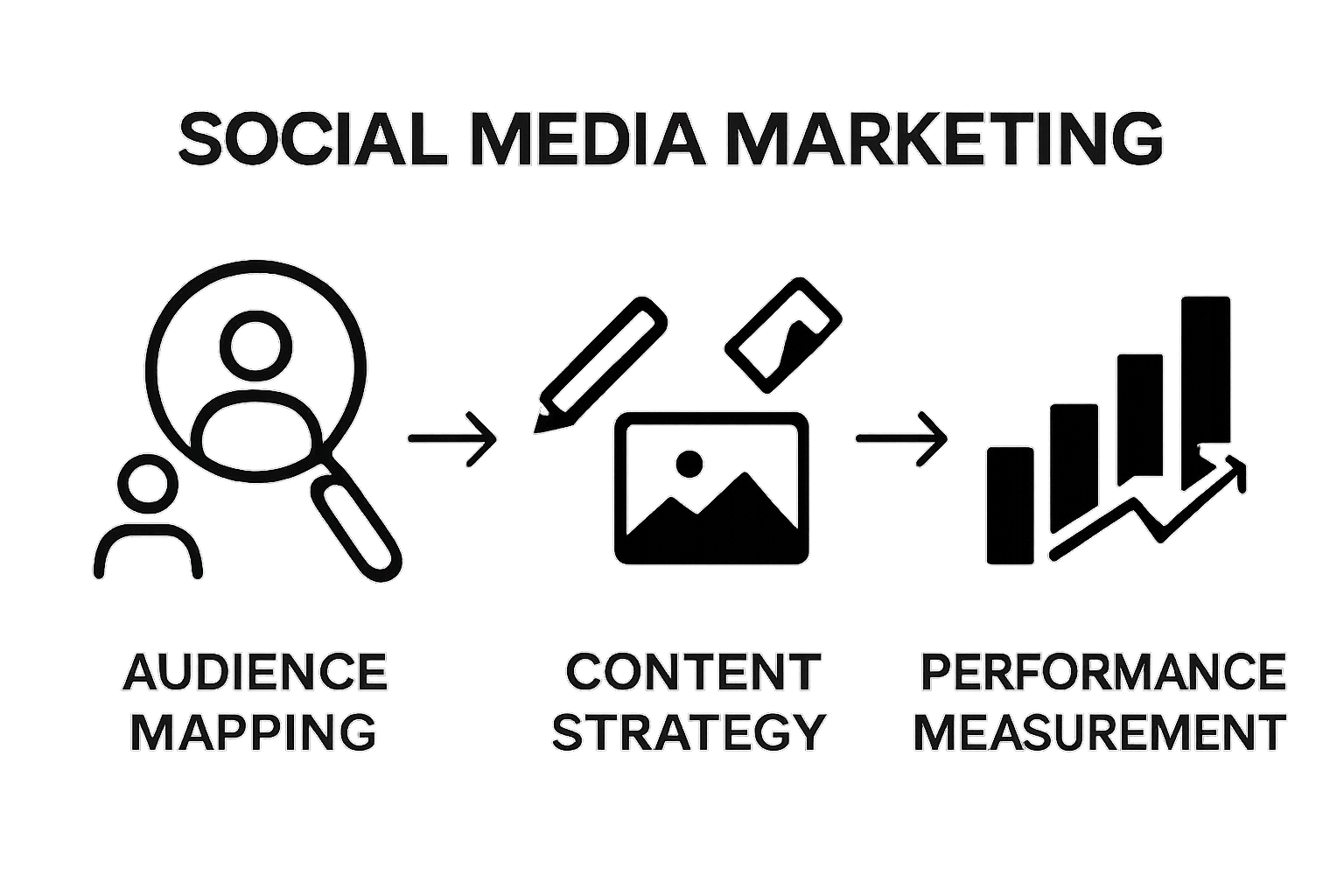Branding Elements That Drive Small Business Growth

Explore the social media marketing framework to grasp its fundamentals, significance, and practical applications in driving business success.

Social media marketing looks simple at first glance. Most brands think posting a few flashy updates is all it takes to win online. But studies show that companies with a structured social media framework outperform random campaigns by up to 30 percent. So the real secret is not posting more often, but building a plan that turns every click into real-world results.
A social media marketing framework is a strategic approach that provides structure and guidance for businesses to effectively leverage social media platforms for marketing objectives. Unlike traditional marketing strategies, this framework recognizes social media as a dynamic, interactive ecosystem that requires nuanced understanding and adaptive tactics.
At its core, a social media marketing framework is more than just posting content. Research from the International Journal of Marketing Studies reveals it encompasses several critical dimensions:
The framework serves as a comprehensive blueprint that transforms random social media activities into purposeful, measurable marketing strategies. It helps businesses move beyond sporadic posting to creating meaningful digital engagement.

Successful social media marketing frameworks typically include interconnected elements that work synergistically:
Businesses adopting a structured social media marketing framework can expect more predictable outcomes, increased audience connection, and more efficient resource allocation. The goal is not just visibility, but creating genuine, value-driven interactions that support business growth.
A cohesive marketing approach transforms disconnected tactics into a strategic, integrated system that amplifies brand messaging and drives meaningful business results. When marketing efforts are fragmented, businesses waste resources and dilute their potential impact. Research from the International Journal of Marketing Studies highlights how systematic, aligned marketing strategies significantly improve organizational performance.
Coherent marketing approaches create a unified narrative that resonates across multiple channels. This synchronization helps businesses build consistent brand experiences that generate trust and recognition.
Below is a comparison table highlighting the differences between a cohesive and a fragmented marketing approach, as described in the article.
ApproachKey CharacteristicsPotential OutcomesCohesive MarketingUnified messaging across channels; consistent visual identity; integrated strategiesBuilds brand trust; optimizes resources; increased engagementFragmented MarketingDisconnected tactics; inconsistent brand voice; lack of coordinationWasted resources; diluted impact; audience confusionConsider how a well-orchestrated marketing strategy ensures that:
Businesses that prioritize marketing cohesion can reduce communication redundancies, optimize resource allocation, and create more compelling audience experiences. Learn more about our comprehensive brand strategy to understand how strategic alignment transforms marketing efforts.
Integrated marketing requires more than surface-level coordination. It demands a holistic approach that connects strategic objectives, audience insights, and communication channels. Successful frameworks incorporate:
By developing a cohesive marketing approach, businesses create a powerful ecosystem where every marketing effort reinforces and amplifies the others. The result is not just increased visibility, but a compelling, resonant brand presence that drives meaningful engagement and business growth.
A successful social media marketing framework requires strategic integration of multiple essential components that work together to create a comprehensive, adaptable approach. These components are not standalone tactics but interconnected elements that generate synergistic marketing outcomes.
Research from the University of Florida emphasizes the critical nature of establishing clear, structured components within a marketing framework. The most effective frameworks include foundational strategic elements that provide direction and clarity:
These foundational elements transform social media marketing from random activities into purposeful, targeted communication strategies. Explore our comprehensive marketing approach to understand how strategic planning drives results.
Successful frameworks also require robust operational components that enable smooth execution and continuous optimization. These include:
By integrating these operational components, businesses can create a dynamic marketing framework that responds intelligently to changing digital landscapes.
The following table summarizes the strategic foundational elements and operational implementation components that form a successful social media marketing framework, as discussed in the article.
Component TypeDescriptionExamplesStrategic Foundational ElementsEstablish overall direction and goals for marketingClear objectives, audience understanding, performance metricsOperational Implementation ComponentsEnable practical execution and continuous improvementContent development protocols, engagement tracking systems, adaptive response mechanismsThe goal is not just execution, but creating a responsive, learning marketing ecosystem that continuously refines its approach based on actual performance and audience feedback.
Brand identity and social media strategy are not separate entities but interconnected components of a holistic marketing approach. Successful integration requires thoughtful alignment of brand values, visual language, and communication style across digital platforms.
Research from Social Media + Society reveals that effective brand integration demands more than superficial consistency. It requires a deep understanding of how brand essence translates into digital experiences. Authentic digital representation means ensuring that every social media interaction reflects the core personality and values of the brand.
Explore our comprehensive brand services to understand how strategic design supports cohesive brand storytelling.
Social media platforms offer unique opportunities for nuanced brand expression. While maintaining core identity, brands must adapt their communication to each platform’s specific culture and audience expectations. This means:
The goal is not to dilute brand identity but to create a multifaceted, engaging digital presence that feels both authentic and contextually relevant. By treating social media as an extension of brand storytelling, businesses can create deeper, more meaningful connections with their audience.

Measuring social media marketing success goes beyond vanity metrics, requiring a comprehensive approach that connects data insights with strategic decision making. Effective measurement transforms raw numbers into actionable intelligence that drives continuous improvement and business growth.
Research from the Hawaii International Conference on System Sciences highlights the importance of establishing clear, meaningful performance indicators. Strategic measurement involves identifying metrics that directly reflect business objectives and audience engagement:
Learn more about our strategic approach to transforming data into meaningful marketing intelligence.
Successful social media marketing requires continuous learning and real-time strategy adjustment. This means developing a flexible framework that can quickly respond to performance data and emerging trends:
The ultimate goal is creating a dynamic marketing ecosystem that learns, adapts, and consistently improves. By treating measurement as an ongoing conversation with your audience, businesses can develop increasingly sophisticated and effective social media strategies that drive genuine business growth.
If you’re tired of watching your social media efforts fall flat and want a stronger, more cohesive approach, you’re not alone. The article has shown how easily marketing gets lost in scattered posting and unclear brand direction. Maybe you know your target audience, but your message feels disjointed or you struggle to track real results. The core issue comes down to the lack of a clear, repeatable framework—one that aligns brand identity, content, and measurement for real business impact.

Reasonate Studio created The Aligned Impact Model™ for entrepreneurs and small business owners just like you. Our proprietary system takes the guesswork out of strategic marketing. It uncovers your brand’s heartbeat, maps out your message, and builds measurable campaigns that move the needle. If you’re ready to get off the treadmill of one-off posts and start building sustainable results, let’s talk. Visit Reasonate Studio today to see how our holistic process can help you create a social media marketing framework designed for clarity, confidence, and true growth.
A social media marketing framework is a strategic approach that guides businesses in effectively leveraging social media platforms for their marketing objectives. It includes understanding audience behaviors, aligning strategies with business goals, and adapting to technological changes.
A cohesive marketing approach ensures that various marketing efforts, including social media, work together to create a unified brand narrative. This synchronization helps build trust, enhances brand recognition, and optimizes resource allocation, leading to better business results.
The key components include clear objectives, audience understanding, performance metrics, content development protocols, engagement tracking systems, and adaptive response mechanisms. These elements work together to create an effective and adaptable marketing strategy.
Success can be measured through meaningful performance metrics such as engagement rates, conversion metrics, and audience growth quality. These indicators allow businesses to evaluate their marketing effectiveness and make data-driven decisions for continuous improvement.